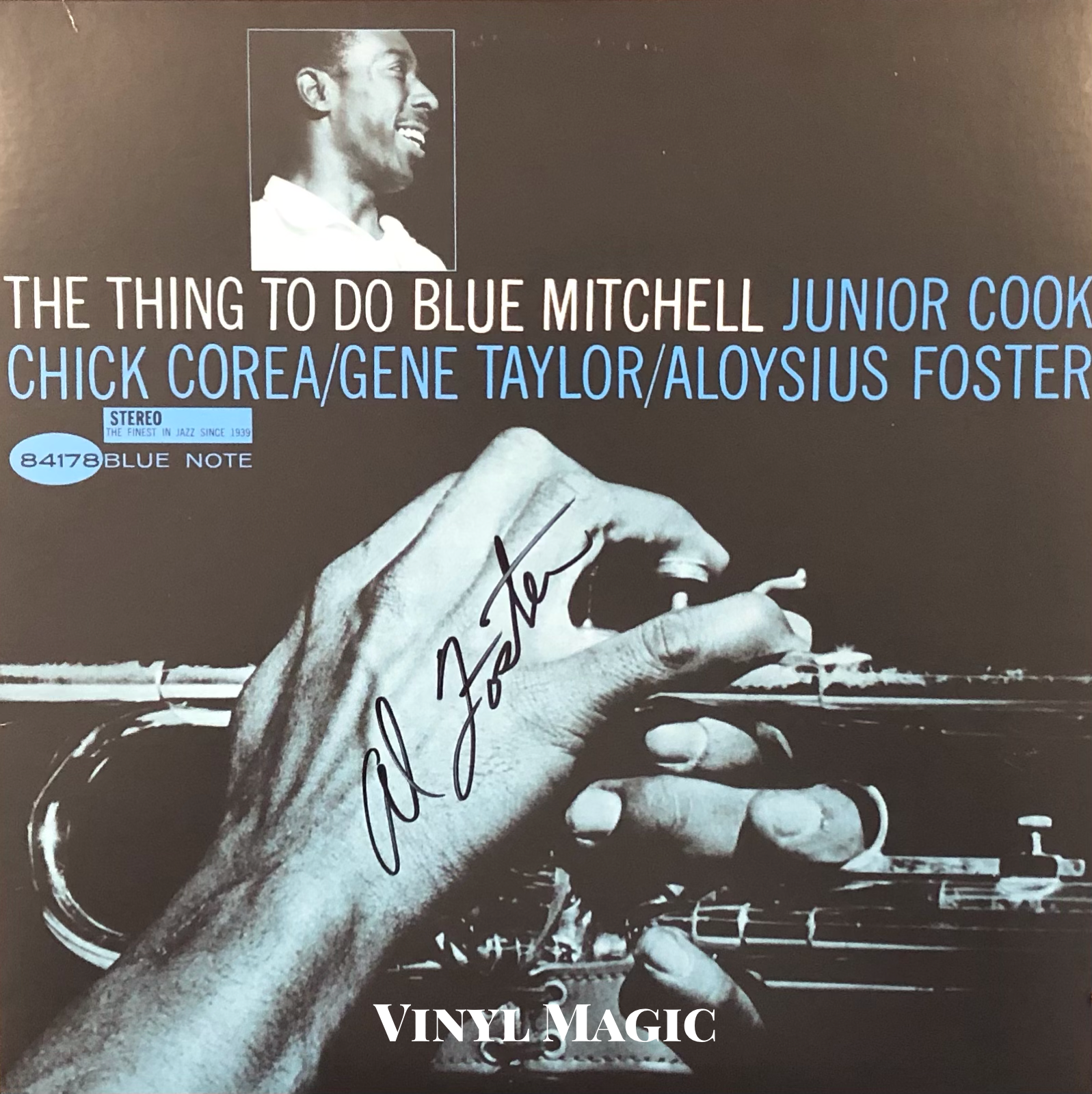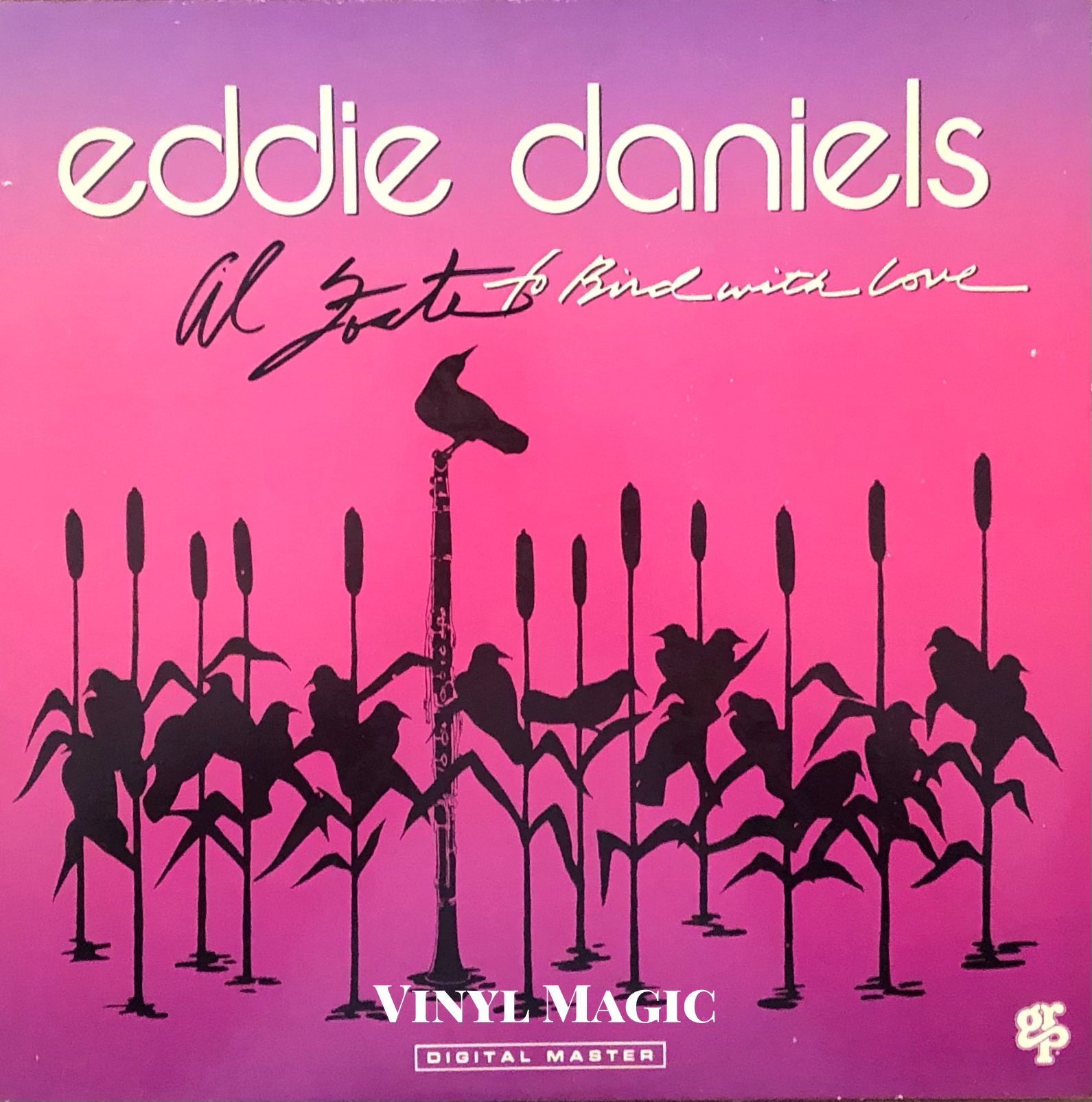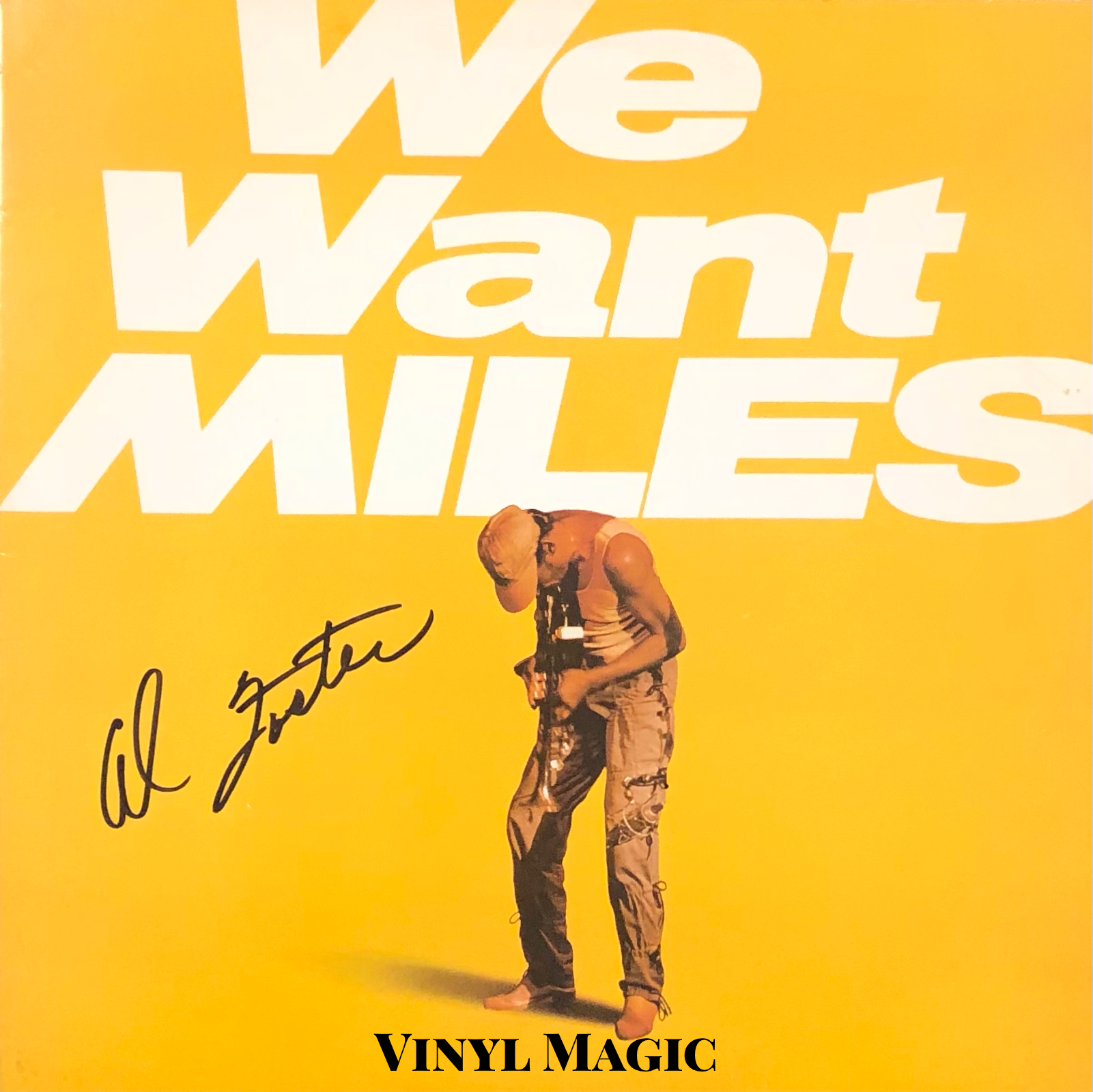Miles Davis, Al Foster, Erin and Me…
At three years old, I was banging on my mother’s pots and pans. My great aunt bought me a practice pad when I was around maybe five, six or seven, and I was practicing all the time. My mother and father were into the swing era before bebop music — Benny Goodman, Gene Krupa — and that’s the first drummer I heard because my father had records. My mother said when I was born on January 18, 1943, “Sing, Sing, Sing” was playing, which was a big hit; Gene Krupa and the first drum solo was on that record, and it was playing when I was born. When I got older, my father bought me a set of drums; I was ten years old. I played them for six months and then stopped. My mother’s mother, my grandmother, told everybody that I told her, “I’m gonna practice when I’m ready.” Anyway, I heard “Cherokee” by Max Roach and Clifford Brown. I was twelve... I heard that record; it was modern jazz, and Max Roach, the great drummer, plays music on the drums. I didn’t know you could make music on the drums, so after that, when I came home from school, every day I’d set up my drums and put my ear to the speaker to try to figure out what he was doing, and that’s how it started. Then I got into Thelonious Monk and Miles, everybody. I’ve worked with those people. I never learned to read music, and can play a little piano, but I have to have somebody write the music and my songs out for me. I’ve been so blessed because I’ve played with everybody I fell in love with when I was a young teenager - Stan Getz, Sonny Rollins, Joe Henderson, Miles, Thelonious Monk, Cannonball Adderley…
Al Foster
We Want Miles (1982) signed by Al, original Kix ticket stub, 1981
I loved him so much. Another thing that people don’t know is that I raised four kids, four daughters, by myself, and I told Miles six months after I joined him, and he asked me to bring them in; maybe he didn’t believe me. I took them up there one Sunday a couple of weeks after I had told him, and a few months after that, he said that when we’re not working, for me to go up to management. This is the God's honest truth. When I wasn’t working, I went to pick up a check for $200 every week of the month. If I was off three months, four months, I got $800 a month, for real, and he never said that he was trying to help me with my daughters, but I felt that. So he wasn’t like his image, being mean, cursing at people, even punching people.
Al Foster
You know, he was little, and he studied boxing...but he was the hippest trumpet player ever because I haven’t heard anybody with that kind of taste. Cool, you know. He would take his time. He knew I didn’t like playing the back beat. I was nervous for the first few years, but after I got to know him, I would say, ” Miles, why don’t we play some tunes with changes, you know, not just one damn chord. Miles would say, “Don’t worry about the changes, worry about the drums.” After that, I kept my mouth shut, you know, but he said everything so cool, never in anger. Even when he’s mad, he’s cool. I respect that because I can lose my temper. I grew up in Harlem and can act like a fool and regret it the next day, but he was always cool. One of a kind.
Al Foster on Miles Davis
The Thing To Do (1964) signed by Al
My idols were Sonny Rollins - he was so melodic on the saxophone - and Max Roach, of course. The music is old now, you know, the forties, fifties, sixties, and then it changed in the seventies, and I joined Miles. He told me to buy Sly Stone, Jimi Hendrix, and Buddy Miles records. Buddy Miles was a drummer who was already famous. Miles used to say, “Buddy Miles has one beat, but Al, he plays the shit out of that beat!” So I had to learn that beat. Miles was too much, you know, but what a beautiful human being. He kept people away from him with his attitude, but he was the sweetest man, really and I miss him so much. I was with him for thirteen years, ’72 to ’85, and then I left and joined Herbie and Stan Getz. Miles called me in ’89 to play on a record... and then I played his last concert before he died, July 10th, 1991. He died September 28th. It was billed “Miles Davis and Friends,” and it was Herbie Hancock, Chick Corea, and Joe Zawinul, three piano players; Wayne Shorter, Steve Grossman, Jackie McLean, sax players; John Scofield and John McLaughlin, two guitar players; and Dave Holland on bass and Darryl Jones on electric bass.
And I was the only drummer. Tony Williams, Jack DeJohnette, and Jimmy Cobb were living, and they made great records with Miles, and he called me. That was the most money I ever made for one hour. Really big money. I didn’t know he was sick. I went to see him just before he died; flew out to LA. His nephew called me and said, “He’s sick, Al. Not like before.” My wife booked a flight for me, and I left the next morning and stayed a couple of days. I think he was in a coma. I’m not sure. He was tapping in my hand. I was holding his hand. When I walked in, the nurse said, “Oh, Miles. Your friend. He came all the way from New York to see you.” He had tubes in his mouth, so he couldn’t talk. Tears were coming down my face, and I said, “Miles, you have to get better. We have to play in New York next week.” I wasn’t even in his band. And that was it. He died a week later.
Al Foster
It’s About Time (1985) signed by Al, Jackie McLean, McCoy Tyner
Bandleader, composer and a drummer's drummer, Al Foster has appeared on hundreds of recordings in his lengthy career. Probably best known for his association with Miles Davis, Al has always been in demand as a faultless timekeeper and human metronome. Born in Richmond, Virginia, raised in Harlem, Al has come a long way from banging on pots and pans as a child to playing with Miles Davis, Dexter Gordon, Herbie Hancock, Frank Morgan and Sonny Rollins and so many other legends.
Yardbird Suite (1988) signed by Al, Frank Morgan, Ron Carter, Mulgrew Miller
His enlistment with Miles was serendipitous. As Miles wrote in his 1989 autobiography, he heard Al at the Cellar Club in New York City, "He knocked me out because he had such a groove and he would just lay it right in there. That was the kind of thing I was looking for. Al could set it up for everybody else to play off and just keep the groove going forever. For what I wanted in a drummer, Al Foster had all of it." Thirteen albums resulted from their 1972-1985 collaboration which also included Miles’ self-imposed retirement from 1975-1980. As Miles said, "I quit primarily because of health reasons, but also because I was spiritually tired of all the bullshit I had been going through all those years. I felt artistically drained, tired. I didn't have anything else to say musically. From 1975 until early 1980, I didn't pick up my horn for over four years, didn't pick it up once. I would walk by and look at it, then think about trying to play." Prodigious amounts of cocaine during this period probably didn't help Miles either during his sabbatical.
Reflections (1989) signed by Al, Ron Carter, Joe Henderson, Mulgrew Miller, Frank Morgan
When Miles agreed to perform again, it was at the behest of his record label CBS who wanted to record a concert at Avery Fisher Hall and release it as an album. As usual, Miles hired young guns - saxophonist Bill Evans, percussionist Mino Cinelu, bassist Marcus Miller and guitarist Mike Stern. Miles was always searching for new sounds and musicians, as he once revealed, "I have to change. It's like a curse." Except for drummers. as Al was the only member of Miles' band who played with him before and after his hiatus.
In The Vanguard (1987) signed by Al, Buster Williams
Since Miles was scheduled to perform in New York City in early July 1981, Miles and his band played a tuneup in Boston. It was a smart move as no one knew what Miles' chops were like after five years of decay and rust. Miles reached out to Fred Taylor who had previously run the highly regarded Paul's Mall and The Jazz Workshop, venues which Miles had played many times in the 1960s and 1970s. Though his clubs had been shuttered for several years, Fred secured a four-hundred seat venue, Kix, an unlikely site at 590 Commonwealth Avenue near Kenmore Square. Kix was a converted parking garage which had been the Psychedelic Supermarket in the 1960s and had hosted some seminal rock concerts by Cream, The Grateful Dead and Janis Joplin with Big Brother & The Holding Company. It was now a cavernous disco and hosted Miles Davis and his new band for four nights, June 26-29, 1981. Tickets were an exorbitant $12.50, but as I was trying to impress my new (would be) girlfriend, and attempting to woo her away from another suitor, I bought the tickets, $25 all in, with no handling and usurious Ticketmaster fees!
This Bud’s For You… (1984) signed by Al
The club was packed and Miles got a thunderous standing ovation before he even played a single note. The audience chanted "We Want Miles," which became the title of the double lp when it was released, and the show was great. Most of the songs on the album were recorded from the performances at Kix, only "Back Seat Betty" was culled from Avery Fisher Hall. The energy and excitement was palpable, as guitarist Mike Stern remembered, "Kix was perfect and the audience was just ready to enjoy it and they did. It was the kind of band where we got off on the energy of it." For Miles, it was a welcome resurgence, "Cause I love Boston. I just happen to have a thing with Boston. Every time I have a new band and a good band, I just come to Boston... I like Boston people. It isn't a question of how many jazz clubs you have here. It's the attitude of the students. The students are thinking, you know what I mean? They are not afraid to look beyond today's music or anything else." Regrettably, this was the first and only time we saw Miles, but, thankfully, not the only time we saw Al Foster!
Mood Indigo (1989) signed by Al, Frank Morgan, Buster Williams
Erin and I were blessed to see Al perform recently at the Jazz Forum, an intimate eighty-five seat venue, in Tarrytown, New York. Tim Armacost, a fine tenor saxophonist, was ostensibly the leader of the quintet which boasted a front line of Michael Rodriguez on trumpet, Tim on tenor, Gary Smulyan on baritone saxophone and John Pattitucci on bass. The real leader of the band, as is often the case in jazz, was the drummer, the redoubtable Al Foster. The band opened with "It's Just The Blues." written by Tim, a bluesy number which featured the stalwart front line trading trumpet, tenor and baritone solos, while the rock-ribbed rhythm was supplied by John Pattitucci's pulsating bass and Al's stout drums. Other highlights included two Thelonious Monk tunes, "Let's Call This" and "Oska T," fun romps with Monk's intricate melodies explored by a piano-less quintet, not the usual fare. Another highlight "The Next 20" was dedicated to the Mayor of Hastings on Hudson, Nicola Armacost who was in attendance, or Tim's wife. It was a gorgeous, lush ballad which showcased Al’s exquisite brushwork. The encore was an uptempo burner, Harold Land's "Vendetta," which capped a memorable night of music.
To Bird With Love (1987) signed by Al
After the show, Erin and I chatted with Al. Our seats were so close that he was held captive and he had to move a cymbal and hi-hat to extricate himself from his perch on the bandstand. First, another well wisher from the audience approached and said, "You know Al, I saw you with Miles in 1981 at Avery Fisher Hall in New York City. What a great show." Erin countered with, "Well, we were at an earlier show at Kix in Boston, and we're still together!" Al grabbed my arm and pulled me close, “Wow, that's incredible," and then he looked me straight in my eyes, "You know, that was all Miles!" The other guest retreated in abject defeat while Erin and I continued our conversation. Al was gracious while he signed a bunch of vinyl, "Oh, you got my first album, I think I was twenty when we recorded this," he said as he signed Blue Mitchell's The Thing To Do, released on Blue Note in 1964. He loved the Frank Morgan albums, "Frank was great and you got Mulgrew (Miller) and Ron (Carter) and Joe (Henderson), those are some great players. Those records were a lot of fun to make. I spent some great times touring with Joe."
We Want Miles (1982) signed by Al
As he signed We Want Miles, I told him how much fun it was for Erin and I to see him all those years ago in Boston. "You know, I started playing with Miles in 1972 after Jack (DeJohnette) left." Al looked around to see who was listening, made a sign of the cross, and then whispered conspiratorially, "You know, I never really liked that band. Miles was playing his trumpet through wah wah pedals, trying to be Jimi Hendrix or something. I really just wanted to play standards. I loved (bassist) Marcus Miller though, he's on this record and it was great playing with him. You know, that's my hat that Miles is wearing on the cover. We had a photoshoot at the soundcheck in New York and Miles saw his nephew (Vince Wilburn Jr.) playing my drums, he said, 'Get that muthaf..ka off those drums.' We went over to my kit, he saw my bag and grabbed my hat. It was brand new and it matched his pants!” Al smiled fondly while pointing to his hat on the album cover.
The Magnificent Tommy Flanagan (1981) signed by Al, Tommy Flanagan
He laughed when he saw the Tommy Flanagan heavy lidded photo on The Magnificent and quickly turned to the back cover, "George Mraz was on this, we played together quite a bit. He had such a great sound. it's a shame we just lost him," he said pointing wistfully to George's photo. The Jackie McLean/McCoy Tyner album elicited a similar emotional response. "I don't know why, but I never liked this session and I love McCoy. The last time I saw him, man it was tough. I had heard that he was sick so I went to see him, but he didn't even know who I was. He just had a vacant stare. All the music and shows we played together, it was all gone. He was gone. That was tough." I handed him A New Kinda Soul recorded in 1970 led by Larry Willis, "Man, this is a great album. This was Larry's first as a leader, I loved playing with Larry, he was a beautiful player." I asked Al about his upcoming gigs, "Oh, I'll be playing around, doing some stuff at Mezzrow soon." 'That's a great venue, I love that space,' I said, 'I was lucky to see Brad Mehldau perform solo there last summer.' "Yes it is a great space. I love Brad, he is a genius," Al gushed. I couldn't agree more! Erin and I thanked Al for his time and especially his contributions to the beautiful music which has been such a positive force in our lives these many years.
Al Foster, a terrific drummer, kind and generous, as Miles said, he keeps the groove going on forever.
A New Kind Of Soul (1970) signed by Al, Larry Willis
Choice Al Foster Cuts (per BKs request)
https://www.youtube.com/watch?v=6dfzlSadHLc&list=PL0RNmJPHxmg-hboNhxbgUF3hgxGHt1vzG&index=8
“Kix” We Want Miles 1981
https://www.youtube.com/watch?v=xVvXB0efwEQ
“The Thing To Do” The Thing To Do Blue Mitchell 1964
https://www.youtube.com/watch?v=Fj8eHq5WCyg
“Recorda Me” live with Joe Henderson, Dave Holland 1993
https://www.youtube.com/watch?v=G1U0vgOW-NI
“Caravan” Reflections Frank Morgan 1989
https://www.youtube.com/watch?v=YWOk5hDDDdc&list=OLAK5uy_nbfI9h67FjUndiLaIw9cwnBPo1FVXw5Io&index=2
“Good Morning Heartache” The Magnificent Tommy Flanagan 1981
https://www.youtube.com/watch?v=5gD2PHRpMqo
“Bouncing With Bud” This Bud’s For You Bud Shank 1984
https://www.youtube.com/watch?v=zP09_dvZoZc
“Consola Coa” A New Kinda Soul Larry Willis 1970
https://www.youtube.com/watch?v=aqQmBtNSUUw
“Someday My Prince Will Come” In The Vanguard Bobby Hutcherson 1987
https://www.youtube.com/watch?v=Y8nkNEa0g2I&list=PLyHn3f7-9IULulVPuo3rThFRCwKVHN08s&index=5
“No Flowers Please” It’s About Time Jackie McLean/McCoy Tyner 1985
https://www.youtube.com/watch?v=VS-pPyYn2Z4
“East Of The Sun” To Bird With Love Eddie Daniels 1987
https://www.youtube.com/watch?app=desktop&v=DBpt6QX4f0w
“The Next 20” Time Being Tim Armacost 2017











